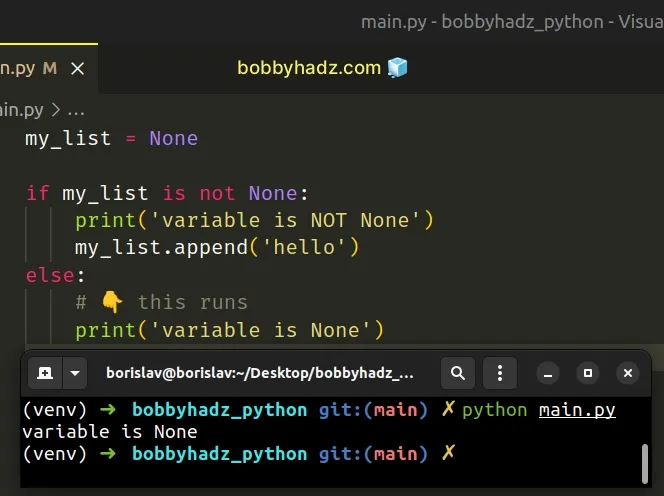AttributeError: 'NoneType' object has no attribute 'append'
Last updated: Apr 8, 2024
Reading time·4 min

# AttributeError: 'NoneType' object has no attribute 'append'
The Python "AttributeError: 'NoneType' object has no attribute 'append'"
occurs when we try to call the append() method on a None value, e.g.
assignment from a function that doesn't return anything.
To solve the error, make sure to only call append() on list objects.

Here is a very simple example of how the error occurs.
my_list = None # ⛔️ AttributeError: 'NoneType' object has no attribute 'append' my_list.append('bobbyhadz.com') # ✅ If you need to check if not None before calling append() if my_list is not None: print('variable is NOT None') my_list.append('hello') else: print('variable is None')

If you need to check if the variable is not None
before calling append(), use an if statement.
my_list = None if my_list is not None: print('variable is NOT None') my_list.append('hello') else: # 👇️ This runs print('variable is None')
Trying to call the append() method on a None value causes the error.
append() on, it will be None, so you have to track down where the variable gets assigned a None value and correct or remove the assignment.# Functions that don't return anything return None
The most common source of a None value (other than an explicit assignment) is
a function that doesn't return anything.
# 👇️ This function returns None def get_list(): print(['bobby', 'hadz', '.']) # 👇️ None my_list = get_list() # ⛔️ AttributeError: 'NoneType' object has no attribute 'append' my_list.append('com')
Notice that our get_list function doesn't explicitly return a value, so it
implicitly returns None.
append which caused the error.The error occurs for multiple reasons:
- Having a function that doesn't return anything (returns
Noneimplicitly). - Explicitly setting a variable to
None. - Assigning a variable to the result of calling a built-in function that doesn't return anything.
- Having a function that only returns a value if a certain condition is met.
# Many built-in methods return None
Some built-in methods (e.g. sort) mutate a data structure in place and don't
return a value. In other words, they implicitly return None.
my_list = ['c', 'b', 'a'] my_sorted_list = my_list.sort() print(my_sorted_list) # 👉️ None # ⛔️ AttributeError: 'NoneType' object has no attribute 'append' my_sorted_list.append('d')
The sort() method sorts a list in place and doesn't return anything, so when
we assign the result of calling the method to a variable, we assign a None
value to the variable.
None.# Checking if a variable is not None before calling append()
If a variable might sometimes store a list and sometimes store None, you can
explicitly check if the variable is not None before you call append().
my_list = ['bobby', 'hadz', '.'] if my_list is not None: print('variable is not None') my_list.append('com') else: print('variable is None') print(my_list) # 👉️ ['bobby', 'hadz', '.', 'com']
The if block will run only if the my_list variable does not store a None
value, otherwise the else block runs.
Alternatively, you can check if the variable stores a list before calling
list.append().
my_list = ['bobby', 'hadz', '.'] if isinstance(my_list, list): print('variable is not None') my_list.append('com') else: print('variable is None') print(my_list) # 👉️ ['bobby', 'hadz', '.', 'com']
The isinstance function returns
True if the passed-in object is an instance or a subclass of the passed-in
class.
my_list = ['bobby', 'hadz', '.'] print(isinstance(my_list, list)) # 👉️ True print(isinstance(my_list, str)) # 👉️ False
# A function that returns a value only if a condition is met
Another common cause of the error is having a function that returns a value only if a condition is met.
def get_list(a): if len(a) > 3: return a my_list = get_list(['a', 'b']) print(my_list) # 👉️ None
The if statement in the get_list function is only run if the passed-in list
has a length greater than 3.
None.To solve the error in this scenario, you either have to check if the function
didn't return None or return a default value if the condition is not met.
def get_list(a): if len(a) > 3: return a return [] my_list = get_list(['a', 'b']) print(my_list) # 👉️ []
Now the function is guaranteed to return a list regardless of whether the condition is met.
# The list.append() method should only be called on a list
The list.append() method adds an item to the end of the list.
my_list = ['bobby', 'hadz'] my_list.append('com') print(my_list) # 👉️ ['bobby', 'hadz', 'com']
The method returns None as it mutates the original list.
If the error persists, follow the instructions in my AttributeError: 'NoneType' object has no attribute 'X' article.
# Additional Resources
You can learn more about the related topics by checking out the following tutorials:

